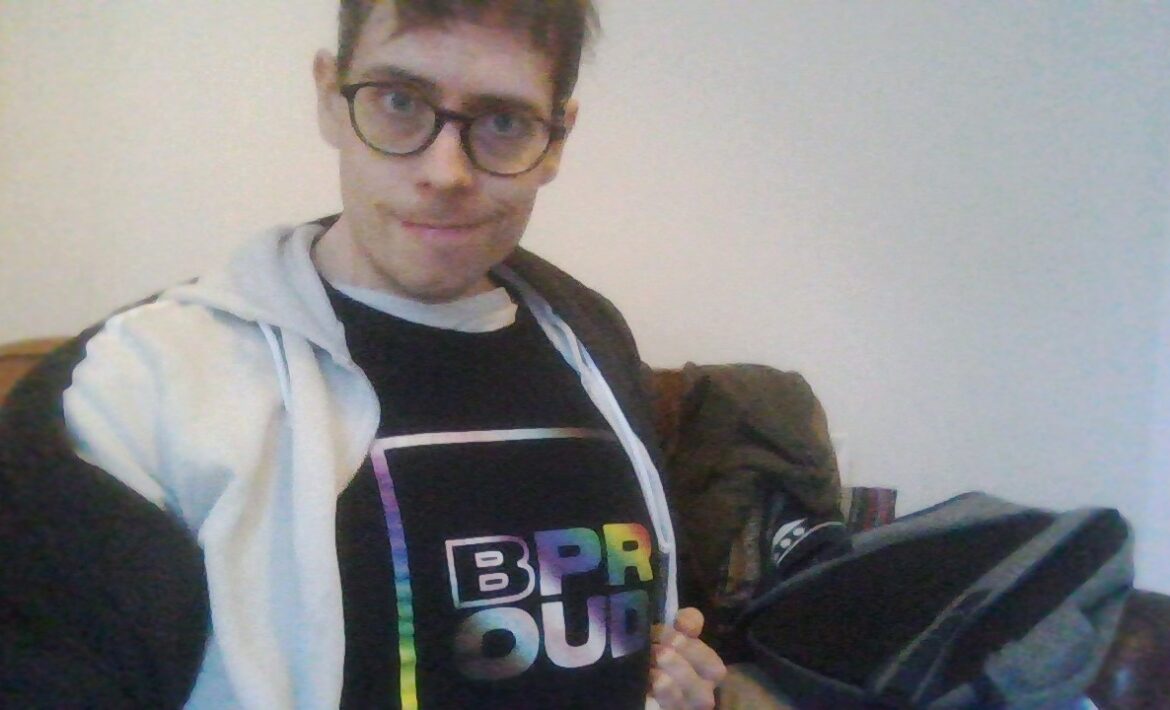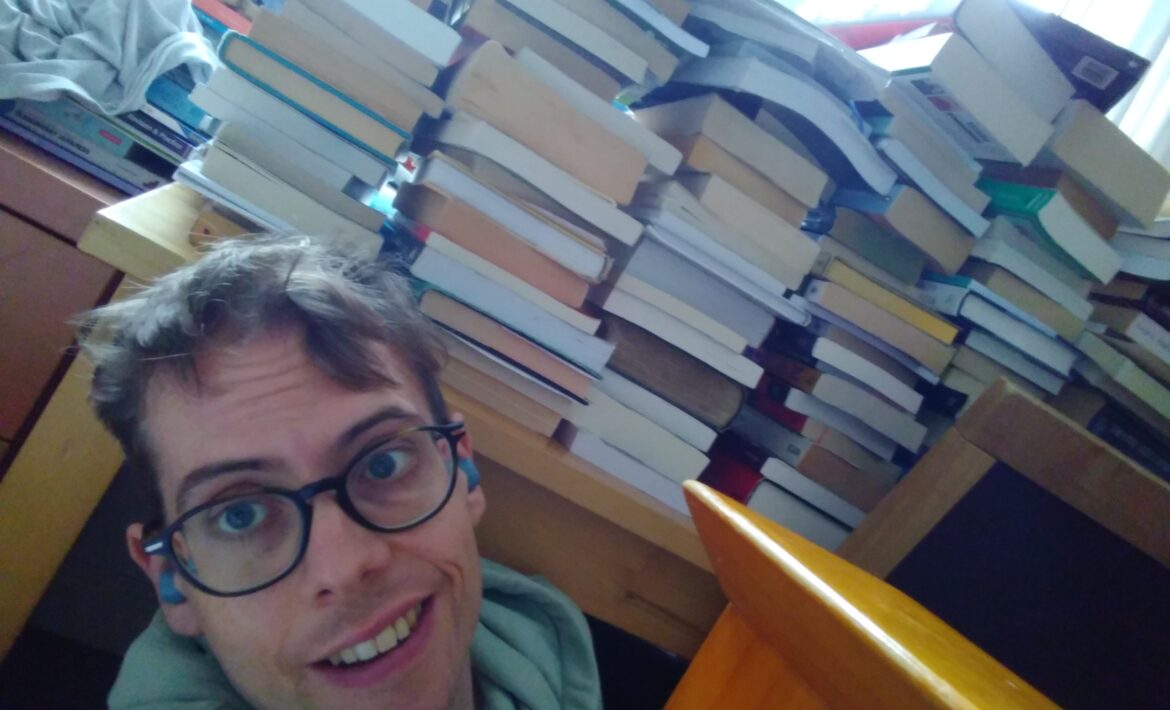
Sunday 18th October 2020 – Autistic in Times of Covid-19: Executive Function and Co-morbid Neurodivergences #2
Hi everybody!
So this week was another intense one. I taught every day, I tutored, I worked as a PA and I have two job interviews. The picture I’m including is from the second interview, on my way on the train. I have no idea what will happen, but I had a great time when I was there and I hope I can be of use there.
This is also my last blog for three weeks – I’m taking that long-needed writing break. Come what may, the manuscript will be sent to an agent on Sunday 8th November. I cannot wait to finally spend the time with the book it’s been crying out for these past three years. It was the reason that I went to an Autism Oxford conference in 2018, where I was picked up by Oxford Health, which has led to everything else. It was in early September 2018 that I went to Penguin Random House HQ for the Write Now workshops, where my book’s focus on the autistic experience wasn’t as welcomed as I’d hoped it would be. But times have changed, very much for the better. Besides, the agent I met there has been waiting ever since. It’s high time.
In the meantime, this blog is me finishing my two-parter on the interconnectedness of neurodivergences. When I was preparing my talk to Oxford University Press a few weeks ago, I was struck by how much I’m affected by what in the popular imagination – and orthodox medical science – are seen as distinct issues and diagnoses. My other autistic friends all are affected in different ways, some of them actually have other diagnoses. For some these have been incredibly useful, not so for others. Yet more have found that one diagnostic statement has stopped them getting assessed and supported for additional needs. It’s a mess. I don’t have diagnoses for any of these diagnostic categories, but I wouldn’t be surprised if I was dyspraxic. I’m not 100%, in fact, if I’m even doing the right thing by asserting these categories as distinct – but I am using them as a shorthand for ease of reading. The point with the neurodiversity paradigm is that current definitions try to pin down facts of existence that are really quite slippery and don’t align clearly with neurotypical attempts to categories. Like being queer, it’s not supposed to make sense within a paradigm that doesn’t currently value us. It’s up to us to redefine the paradigm.
ADHD
I am not sure that I’ve got ADHD but I do remember getting very hyped up and climbing up steel scaffolding ten years ago, in my first teaching week at Sussex. I was mortally embarrassed about that for years. I also have severe issues with focus and concentration. Sometimes I can lose myself in writing or reading novels. Other days I can barely comprehend the written word. I can still recognise the letters – I just don’t have the bandwidth to internalise the information. Even podcasts or (educational) videos become too much. With listening to music I’ve become very inconsistent. I consume new music very slowly, but intensely. I will only engage with a few new albums every year, but these will usually be profoundly meaningful to me. When I swim, I have a list of 100 songs in my head that I play to keep the count from 1 to 100 lengths.
My focus can move to very interesting places. I have taught myself to engage in ‘productive distraction’. I put several tasks in front of me, so I start one and then allow my attention to drift to the second one, then the third. A few hours later, all are finished, as I flit between tabs on my browser. Sometimes I have ‘starting anxiety’ where my focus is affected by my anxiety. In the end, I achieve nothing and feel worthless to boot.
DYSLEXIA
When it comes to reading, both of us are hyperlexic, but my focus really falls off a cliff when I’m too busy. I need to have the brainspace to rest and recover. My brother is very dyslexic, however. I started reading at 3, before he was born. He couldn’t read till he was 10. We are equally neurodivergent and equally intelligent. The problem with having autistic tropes in media is that we are still mostly represented as white, male, middle class cishet nerds. Not that there is anything wrong with that – some brilliant autistic people do fit that stereotype! But the cultural associations with that group already have a specific view of autistics’ connection to the written word. We are supposed to be coders, fanfic authors or academics who dig into mathematical equations. But the truth is many of us struggle with reading and writing.
Dyslexia is still overwhelmingly seen as a problem with a child’s inherent intelligence. Autism is seen as a “nerd disorder” – appropriative “representation” by shows such as Big Bang Theory don’t do much to help that. If the main ways we think about intelligence are numeracy and literacy – then someone who struggled with marks on pieces of paper, then our definition of intelligence excludes dyslexics. The detachment that dyslexic autistics feel from either identity is that they neither fit in to either neurotypical view of what dyslexics or autistics are supposed to be. If you are dyslexic and you’re finding out you’re autistic, you have a barrier in front of you. How can you learn about yourself if reading is the primary way that learning needs to happen? Not everyone has access to audible or is technologically literate.
DYSPRAXIA
Looking back, it was my dyspraxic aspects that made my life most difficult as a child. I hated sports and I was terrible at everything I tried. I was never able to develop a joy in movement for its own sake – it was always connected to a need to lose weight. Of course I was always picked last during PE. Dyspraxics struggle with practical physical skills, such as cleaning, organising our lives, driving and dressing ourselves. We are often described as uncoordinated and clumsy by others.
In my case, it took me 20 years to properly learn how to tie my shoelaces. In school, I was consistently marked down for “not trying” with my handwriting. I still lose things and despise doing so. I will never drive a car. I struggled for years with cleaning. I also struggle with crowds and commuting is never fun. I also really struggle with depth perception, to the point of being incapable of doing geometry. I simply cannot perceive 3D space on a 2D plane. I used to fall over quite a lot, too. Though, after having been on benzos, that rarely happens now.
But my body is also immensely sensitive – in the best way. I need physical touch. If I haven’t been hugged for a few days, I feel my mood drop. Exercise is joyful – especially swimming. It makes my body tingle. The new toy whale I bought my partner for his birthday is my most recent favourite form of skin stimulation. Intimacy is something I will write about at some point; though not today.
OCD
Obsessive-Compulsive disorder and autism are often seen as one and the same. Autistics and people with OCD both perform so-called rituals in order to function as best as possible. There is some overlap, sure. But we are comparing two similar outcomes where the difference is in kind. OCD is an anxiety disorder that develops as a result of some previous trauma or permanent sense of insecurity. It is a despairing grasp to have at least some part of one’s life under control. Autistic people also use ritualistic-seeming behaviour, but that is not inherently based in anxiety. We can stim for the joy of it. Yes, autistic people are more vulnerable to developing an anxiety disorder, but this is partly due to our sensory world making the universe significantly more overwhelming and, of course, minority stress and misunderstanding.
In my reading, I haven’t come across someone with OCD who describes it as a source of joy. It isn’t, it’s an illness that can be treated – though please inform me if I’m wrong. Autism is not. Is it a neurodivergence? Perhaps in the way it modifies neurological functioning, but perhaps not in essence. Again, there are incredible scientists who are far more knowledgeable about this than I could ever be.
INTELLECTUAL DISABILITY
I personally do not have an intellectual disability – a brain issue that limits my capacity to learn and perform complex tasks. Let me be clear: there is absolutely nothing wrong with those of us that do. We are no worse and no better than people with learning disabilities. Autistics are hit in several ways by the association society has with learning disability. The language associated with learning disability is demeaning and derogatory, freely expressed as learning disabled people apparently “can’t understand” (in fact, many of you will be surprised how kind, intelligent and empathic learning disabled people can be!). This language was used against me throughout my childhood and adolescence. It still hurts and triggers post-traumatic stress. Fortunately for me, I live in a country where that language isn’t spoken at all.
Another point is about the myth of ‘high-functioning’ versus ‘low-functioning’. This entire conception is false. People are autistic in their particular ways, some of whom have additional learning disabilities. It is not that the autism-button was pressed harder, it is that autistic people are more likely to have learning disabilities.
Another problem: many learning disabled people are autistic. They are not “very” autistic, “severely” autistic, “suffering” or anything else. The thing they suffer from is exclusion. I have been around learning disabled groups in Oxford. They are pretty much 100% neurotypical. Autistics with learning disabilities are excluded from these groups, as well as from the few autistic groups that exist, which tend to focus on those who use the spoken word and have average to higher intellectual capacity. There is no space for these people. They may have a learning disability, but they are just as autistic as we are and I am proud to share my autism with them. If there are crackdowns on people with learning disabilities, I will do my best to listen to them and stand with them to protest their and our shared interests being attacked.
PTSD
As stated before, PTSD has been noted to affect neurological functioning, so some see it as an “acquired neurodivergence”. I am not so sure, but I am autistic and I have had Complex PTSD since I was very young. I am not the one to untangle this.
________________________________________________________________
So these were a few aspects of neurodivergence and how they interact. I believe autism to be a nexus of neurodivergence, at the centre of a web of glorious neurological difference. But I’d love to hear from you. Are you autistic and are neurodivergent in other ways? Are you neurodivergent but not autistic, though can understand the ways our lives are affected by the neurodivergent brains we share? Let me know. I’m always happy to receive comments, emails or messages.
I’ll see you in three weeks, when I’ll have finished a book!
All my love!
Jorik


